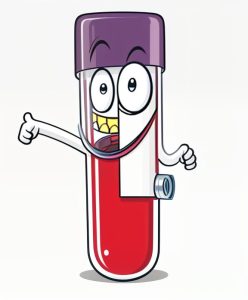In this article:
Blood tests play a crucial role in maintaining your health, even when you don’t exhibit any symptoms or visible problems. They serve several essential purposes:
 Early Detection:
Early Detection:
- Blood tests can identify potential health issues before they escalate into more serious conditions. This early detection allows for timely intervention and prevention.
- Imagine it as catching a small leak in your house before it turns into a flood – addressing it early saves you from major damage.
- Lifestyle Assessment:
- Blood tests act as a reliable source of information to evaluate the impact of your lifestyle choices. If you’ve recently made changes to your habits – whether it’s a new exercise routine, dietary adjustments, or stress management – blood tests provide insights.
- Think of them as a health report card, showing how well your choices align with your well-being goals.
Remember: Appropriate blood test planning and requests not only benefit patients but also reduce demands on healthcare resources. Plus, it’s a win for the environment – fewer unnecessary medications mean less strain on our planet. 🌱🩸
Early Detection
Let’s delve deeper into the importance of early detection through blood tests. Imagine you’re on a health journey, and blood tests are like your trusty compass – guiding you toward better well-being. Here’s how they work:
- Detecting Silent Threats:
- Cholesterol Levels: A simple blood test can reveal your cholesterol levels. High cholesterol might not announce itself with fireworks, but it’s a silent saboteur, increasing your risk of heart disease and stroke. Catch it early, and you can tweak your diet or consider medication.
- Diabetes Clues: Blood sugar levels can hint at diabetes. Detecting prediabetes early allows you to make lifestyle changes and prevent full-blown diabetes from gate-crashing your health party.
- Thyroid Troubles: Thyroid hormones play conductor in your body’s orchestra. An out-of-tune thyroid can cause fatigue, weight changes, and mood swings. Blood tests help spot thyroid issues before they crescendo into major problems.
- Nipping Anemia in the Bud:
- Feeling perpetually tired? Anemia might be lurking. Blood tests reveal your hemoglobin levels – crucial for oxygen transport. Early detection means you can boost iron intake and skip the “zombie mode.”
- Liver Love:
- Your liver is the ultimate multitasker – detoxifying, storing energy, and producing proteins. Blood tests check liver enzymes. Elevated levels could signal liver damage or disease. Early action can prevent further harm.
- Kidney Clues:
- Kidneys filter your blood like meticulous librarians. Elevated creatinine levels might hint at kidney trouble. Detect it early, and you’ll avoid overdue fines (read: kidney failure).
- Cancer Hints:
- Tumor markers in blood can raise suspicion of cancer. Detecting these early allows for targeted investigations. Remember, early-stage cancer is like a shy guest – easier to manage before it throws a wild party.
- Heart Health Insights:
- Blood tests reveal cardiac biomarkers. Elevated troponin levels? Your heart might be sending an SOS. Early intervention prevents heart attacks from gate-crashing your life plans.
These blood tests aren’t just numbers; they’re whispers from your body, urging you to pay attention. So, next time you roll up your sleeve, thank your veins – they’re your health’s secret informants.
Lifestyle Assessment
 When it comes to evaluating your health strategy, there are several clues you can use. Consider tracking aspects such as sleep quality, weight gain, digestion, and energy levels. However, our cultural bias often leads us to believe that health problems are solely due to our genes or that there’s little we can do beyond relying on magical pills. In reality, many age-related illnesses are closely tied to our habits – both good and bad.
When it comes to evaluating your health strategy, there are several clues you can use. Consider tracking aspects such as sleep quality, weight gain, digestion, and energy levels. However, our cultural bias often leads us to believe that health problems are solely due to our genes or that there’s little we can do beyond relying on magical pills. In reality, many age-related illnesses are closely tied to our habits – both good and bad.
Remember those carefree days at age 15 when you felt perfectly healthy? Back then, your body bore fewer “scars” from unhealthy choices. Younger individuals tend to experience fewer tumors, cardiovascular issues (like high blood pressure and cholesterol), and sleep disturbances. Why? Because a youthful body is inherently healthier and better equipped to handle the daily wear and tear caused by life itself. Consider the simple act of exposing your skin to the sun: it generates thousands of mutations in the DNA of the skin cells and potential tumors. But a healthy body (or “younger” body) is usually perfectly equipped to deal with these damages and neutralize the risk. The same happens with many conditions and diseases, as well as psychological problems.
While turning back the clock to your 15-year-old self may be impossible, you can certainly shave off years – even decades – by reducing stress on your body. By adopting a lifestyle that minimizes wear and tear, you enhance your resilience against diseases. Your body regains its ability to self-defend and recover effectively.
And this is precisely why blood tests play a crucial role. They provide valuable insights into your overall health, allowing you to make informed choices and maintain a vibrant, youthful well-being. 🌿🩸
Imagine you decide to make some changes in your routine. During winter, you didn’t walk much, but you were running in the gym. You also did more resistance training than usual and ate more meat and cheese in an attempt to gain muscle mass. Now that spring has arrived, you’re ready to change your strategy: walk more, go for longer jogs, and do fewer weights. Additionally, as you feel you gained too much weight during winter, you decide to cut back on cheese. How will you know which strategy is better for your health? The easiest and probably best way is to take a blood test at the end of winter, then another one after 3-4 months into the new regimen, and compare the differences. If the second strategy is better, you’ll see it reflected in your blood tests.
But which tests can serve this purpose effectively? Which markers will tell you if your body is actually getting younger or older?
Picture by Lukasz Szczepanski
WHICH TESTS SHOULD YOU TAKE ROUTINELY? (DON’T FORGET TO ASK YOUR DOCTOR FOR ADVICE)
COMPLETE BLOOD COUNT
This test provides information about your red and white blood cell count, hemoglobin levels, and platelet count. It can help detect conditions such as anemia, infections, and blood disorders. The more red cells you have, the better your body can transport oxygen to the muscles, giving you more endurance and energy. White cells, on the other hand, indicate how well your immune system is functioning and whether there is a current or recent infection in your body.
HBA1C (Glycated Hemoglobin)
This test measures your average blood sugar levels over the past two to three months. It is commonly used to diagnose and manage diabetes, but it’s also a good indicator for insulin resistance. Insulin resistance measures your sensitivity to the presence of glucose in the blood and your ability to burn it for energy or store it as fat. Insulin resistance may lead to various health problems and is one of the main causes of diseases related to chronic inflammation and obesity. Thanks to this test, you can learn if you’re active enough throughout the day because laziness is one of the main reasons for high blood sugar and insulin resistance. Consider reducing the consumption of high-glycemic foods such as processed foods, white bread, or sugar.
Do you want to know more about glycation, what is it and why is it bad for you? Check our article: AGEs and the Aging Process: A Sweet and Bitter Connection
LIPID PANEL
This test evaluates your cholesterol levels, including LDL (bad) cholesterol, HDL (good) cholesterol, and triglycerides. It helps assess your risk of heart disease and stroke.
APOB/APOA1
This ratio measures the balance between harmful and protective cholesterol particles in your blood. It provides additional information about your cardiovascular health. The lower this number, the better your body is at regulating cholesterol in the blood. If this number is too high, you either have a genetic variation that makes you absorb more cholesterol from food than you actually need, or your liver is not doing a good job at regulating it. The second case is much more common and is usually due to high alcohol consumption and chronically elevated blood sugar levels.
Too high APOB/APOA1 means that you need to improve your diet, be more physically active, and improve your sleep.
Did you know that eggs are probably not the culprit for your high cholesterol levels? Read the article to understand why: Eggs: the secret for eternal youth?
THYROID PANEL
This test assesses the functioning of your thyroid gland, which plays a crucial role in regulating metabolism, energy levels, and mood. It measures TSH, T4, T3, and other markers. When these markers are offset, it might mean that you need to do a better job managing your stress (which includes not only avoiding stressful circumstances or “caring too much,” but also avoiding overtraining). Additionally, you might be consuming foods that trigger an immune response, such as an excess of gluten-rich foods. Insufficient good-quality sleep or an iodine deficiency could also contribute to these imbalances.
Want to know how to improve your sleep quality? Here are some essential tips: There’s More to Sunlight than you Think
AMYLASE TEST
This test may be used to detect pancreas problems. Alcohol consumption, smoking, and eating disorders (such as consuming excessively greasy foods) might be the culprits here, as well as infections or autoimmune responses. Once again, the first way to lower inflammation in our body is to eat a healthy, varied diet, avoid alcohol and processed foods, nourish your microbiome with plenty of vegetables and fruits, and stay active. Elevated amylase results might indicate that you’re not doing a good job at this.
To receive some tips on how to improve your diet and reduce inflammation in your body, read the article: The Easiest Way to Eat Healthy
CREATININE
Creatinine is a waste product of muscle activity. Higher creatinine levels may indicate severe muscle damage or that the kidneys are not doing a good job of clearing up your blood, or that they have to deal with too much of it—more than they can handle.
Here are some factors to consider:
- Exercise and Muscle Breakdown:
- If you’ve been hitting the gym hard, your muscle breakdown increases, leading to higher creatinine production.
- Dietary Choices:
- Consuming cooked meats (which contain creatinine) can influence your levels. So, if steak and roast chicken are frequent guests at your dinner table, your creatinine might reflect that.
- Hydration Matters:
- Dehydration can temporarily elevate creatinine levels. Staying well-hydrated helps maintain accurate readings.
- Kidney Health:
- Lifestyle factors like smoking, alcohol consumption, and maintaining a healthy weight play a role.
- Quitting smoking, moderating alcohol intake, and staying active all contribute to kidney health.
It is essential that you learn how to stay active without overdoing it. Remember: over training might come at a cost. Check our article to learn more about this: Physical activity is not what you think
C-REACTIVE PROTEIN (CRP)
CRP, or C-reactive protein, is a liver-produced protein. Its levels rise in response to inflammation within your body. While CRP doesn’t pinpoint the exact cause of inflammation, it serves as an early warning system. Elevated CRP levels indicate inflammation in the body, which can be an early sign of various chronic diseases, including cardiovascular disease, rheumatoid arthritis, or lupus. The lower it is, the lower the level of chronic inflammation too. While I do not want to get repetitive, your lifestyle might and will affect your inflammation levels, making you more vulnerable to environmental factors.
Consider the following factors:
- Dietary Choices:
- A heart-healthy diet, rich in vegetables and omega-3 fatty acids, can help manage CRP levels.
- Physical Activity:
- Regular exercise keeps CRP in check.
- Weight Management:
- Maintaining a healthy weight positively influences CRP.
- Smoking and Stress:
- Smoking raises CRP, while stress management plays a role.
- Quality Sleep:
- Prioritize restful sleep to support overall health.
Fight inflammation by fighting stress first! Breathing exercises can aid you in this battle: Non Sleep Deep Rest – an incredible tool for recovery, learning and mind health
MINERALS AND VITAMINS
This test measures the levels of essential minerals and vitamins in your blood, highlighting any deficiencies that may affect your overall health. Common minerals and vitamins tested include iron, vitamin D, and vitamin B12. Sometimes we don’t realize that many problems we might have—or perhaps we’re not even aware of them—such as sleeping problems, dry and red skin, excessive hair loss, general weakness, or lack of focus, are caused by simple mineral or vitamin deficiencies that can be easily detected and even more easily solved.
The Takeaway
While no single test directly measures “getting younger,” improvements in overall health often correlate with more youthful markers.
Look for trends in cholesterol, blood sugar, inflammation (CRP), and kidney/liver function.
Remember, consistency matters – repeat blood tests periodically to track progress.
Remember, everyone’s needs are different, so it’s important to consult with a healthcare professional to determine the frequency and specific tests that are most suitable for you.
Ready to take a blood test? For more tips on maintaining health and youthfulness at any age, explore our comprehensive article:
The 10 most efficient, scientifically proven habits to stay young and fit at any age
References:
- Won Jin Ho, Laura D. Wood. Opposing roles of the immune system in tumors. Science 373, 1306-1307 (2021). DOI:10.1126/science.abl5376
- Rungratanawanich et al. Advanced glycation end products (AGEs) and other adducts in aging-related diseases and alcohol-mediated tissue injury. Experimental & Molecular Medicine (2021) 53:168–188 https://doi.org/10.1038/s12276-021-00561-7
- Piticchio Tommaso et al. Effect of gluten-free diet on autoimmune thyroiditis progression in patients with no symptoms or histology of celiac disease: a meta-analysis, Frontiers in Endocrinology 14, 1664-2392 (2023). DOI=10.3389/fendo.2023.1200372 https://www.frontiersin.org/journals/endocrinology/articles/10.3389/fendo.2023.1200372
- Christos Kasapis, MD,* Paul D. Thompson, MD, FACC†. The Effects of Physical Activity on Serum C-Reactive Protein and Inflammatory Markers. A Systematic Review. Journal of the American College of Cardiology 45 (2005). doi:10.1016/j.jacc.2004.12.077
Disclaimer
Consult a health professional before making significant changes to your diet, exercise routine, or supplement regimen. The information provided in this blog is intended to convey the latest scientific research in an accessible manner. However, it does not replace the advice of a medical professional. Take your health conditions into account and consult a qualified healthcare provider to ensure that the decisions you make are safe and appropriate for your specific health needs. Ultimately, you are responsible for your own health and well-being.





